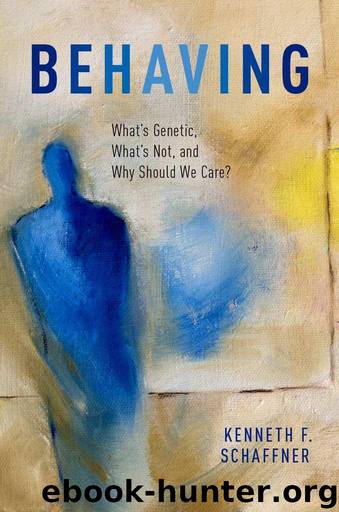Behaving: What's Genetic, What's Not, and Why Should We Care? by Schaffner Kenneth F

Author:Schaffner, Kenneth F. [Schaffner, Kenneth F.]
Language: eng
Format: azw3
Publisher: Oxford University Press
Published: 2016-05-01T16:00:00+00:00
PERSONALITY GENETICS: A TALE OF MANY THEORIES
Several research programs in human behavioral genetics have proposed that fairly general personality features have a substantial genetic component. This idea has hoary roots. Darwin and Galton addressed these issues in the century before last. Darwin in particular explored the relation between emotions in humans and animals in a chapter in his Descent of Man (Darwin 1871) and more fully the following year in his Expression of Emotions in Man and Animals (Darwin 1979). And psychologist Jerome Kagan summarized his investigation into the temperament aspect of personality in his book Galen’s Prophecy (1994), in which he traced all the way back to Galen of Pergamon the idea that much of the variation in human behavior is due to difference in temperament types. Early work in the area of behavioral genetics on “personality” analogues in animals, especially on temperament, focused on dogs. Two decades of their extensive work on the dog is summarized in Scott and Fuller’s monograph (1965), which has played an important role in behavioral geneticists’ thinking about the impact of genes on human behavior and personality (Kendler, personal communication, 2005; Plomin et al. 2008, 60–63; Plomin et al. 2013, 50–52). Plomin’s route to his work in personality genetics was a consequence of his developing an allergy to mice, which resulted in his stopping his mouse behavioral research. Human personality genetics then seemed to be an attractive alternative area of study (Plomin, interview, March 11, 2004).
There are probably more than two dozen different theories of personality that attempt to capture and systematize in a general scheme those traits that we think of as associated with the lay meaning of the term “personality.” Among these described in one introductory textbook are the psychodynamic theories of Sigmund Freud, Carl Jung, Alfred Adler, Karen Horney, Erich Fromm, Harry Stack Sullivan, and Erik Erikson. Also noted are the behavioral and cognitive theories of B. F. Skinner, Albert Bandura, and Julian Rotter. A third major approach includes the dispositional theories of Raymond B. Cattell, Hans Eysenck, and Gordon Allport, and finally there are the humanistic/existential theories of George Kelly, Carl Rogers, Abraham H. Maslow, and Rollo May (see Feist and Feist 2001; a similar extensive range of personality theories can be found in John, Robins, and Pervin 2008). Further complicating the study of personality is a long-running controversy over whether normal populations exhibit the same or distinctive features of personality found in clinical subjects, some of whom will be diagnosed with “personality disorders.”1 This is an issue I return to below.
As Bouchard and Loehlin state in their review article on personality genetics, many of these personality theories can be described as “literary.” Noting that though these are “fascinating … and often profound,” they suggest that if one wishes examine empirically testable approaches, this will principally involve what are called “trait” theories of the sort that Eysenck developed. All of these trait theories propose key dimensions of both lower and higher orders that I shall describe shortly. The higher-order
Download
This site does not store any files on its server. We only index and link to content provided by other sites. Please contact the content providers to delete copyright contents if any and email us, we'll remove relevant links or contents immediately.
Enlightenment Now: The Case for Reason, Science, Humanism, and Progress by Steven Pinker(7306)
A Journey Through Charms and Defence Against the Dark Arts (Harry Potter: A Journey Through…) by Pottermore Publishing(4798)
The Immortal Life of Henrietta Lacks by Rebecca Skloot(4576)
A Journey Through Divination and Astronomy by Publishing Pottermore(4379)
Elon Musk by Ashlee Vance(4121)
Origin Story: A Big History of Everything by David Christian(3687)
COSMOS by Carl Sagan(3617)
Alchemy and Alchemists by C. J. S. Thompson(3515)
Bad Pharma by Ben Goldacre(3422)
Enlightenment Now by Steven Pinker(3367)
Shadow of Night by Deborah Harkness(3359)
Inferior by Angela Saini(3311)
A Mind For Numbers: How to Excel at Math and Science (Even If You Flunked Algebra) by Barbara Oakley(3301)
Origin Story by David Christian(3194)
The Code Book by Simon Singh(3177)
Signature in the Cell: DNA and the Evidence for Intelligent Design by Stephen C. Meyer(3130)
The Elements by Theodore Gray(3050)
A Brief History of Time by Stephen Hawking(3022)
A Journey Through Potions and Herbology (A Journey Through…) by Pottermore Publishing(2848)
